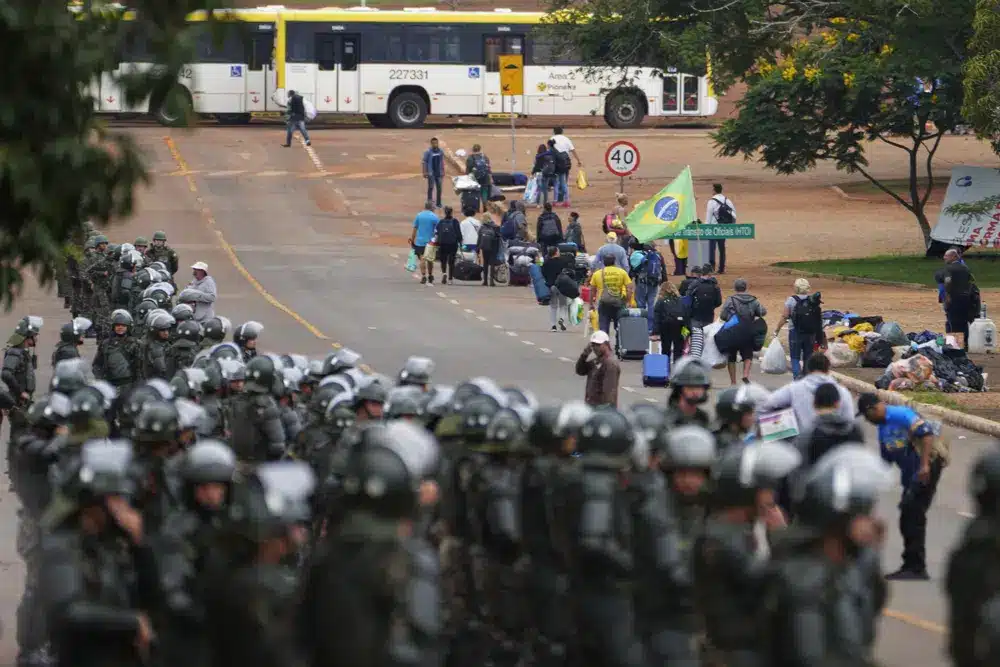Authorities in Brazil said Monday that they were investigating who was behind the stunning revolt that saw demonstrators pouring into the nation’s seats of power in a riot that had a remarkable resemblance to January 6, 2021, insurgency at the United States Capitol.
Thousands of supporters of ex-President Jair Bolsonaro flooded into Congress and the presidential palace on Sunday in an extraordinary demonstration for Latin America’s largest country. Many of them said they wanted Brazil’s army to topple the newly installed leftist president, Luiz Inácio Lula da Silva, and bring the far-right Bolsonaro to office.
Also, on Monday, police broke up a pro-Bolsonaro encampment outside a military building and detained about 1,200 people, according to the justice ministry’s press office. According to the federal police press office, the force has already planned to indict approximately 1,000 persons.
The heads of the Supreme Court all signed a statement condemning the attack and promising legal action.
According to Justice Minister Flávio Dino, police have begun following those who paid for the buses that took protesters to the city. He added at a news conference on Monday that rioters appeared to aim for their displays to have a domino effect across the country and that they may be prosecuted with a variety of felonies, including organized crime, plotting a coup, and violent eradication of the democratic rule of law.
“We believe the worst is behind us,” Dino said, adding that the administration is now focusing on punishing lawbreakers. “We will not compromise in carrying out our legal obligations because doing so is critical to preventing similar occurrences from happening again.”
Brazil’s Protests Continue
Rioters dressed in the national flag’s green and yellow shattered windows, knocked over furniture and threw computers and printers to the ground. They smashed other works of art and punched holes in a huge Emiliano Di Cavalcanti painting at the presidential palace. They threw a U-shaped table where Supreme Court justices meet, took a door off one of the justices’ offices, and destroyed a statue outside the court. The interiors of the buildings were left in ruins.
The arrests on Monday were in addition to the 300 persons arrested during the unrest on Sunday.
Police were noticeably reluctant to respond, even after more than 100 buses arrived, prompting many to question whether officials simply ignored multiple warnings, overestimated the protesters’ power, or were somehow complicit.
Prosecutors in the capital stated the local security forces were, at best, inept. The regional governor was provisionally suspended by a Supreme Court justice. Another justice chastised authorities for failing to respond quickly to the emerging fascism in Brazil.
Bolsonaro, who has since gone to Florida, has been fueling belief among his ardent fans that the country’s electronic voting system is prone to fraud, although he never presented any evidence. Eduardo Bolsonaro, his legislator son, met with former US President Donald Trump, Trump’s longtime supporter Steve Bannon, and his top campaign strategist, Jason Miller.
Brazil President Hospitalized
As word circulated that Bolsonaro was hospitalized in Florida with abdominal pain, the remaining Bolsonaro supporters dispersed by early afternoon Monday. Although his condition was unknown, a photo published by the Brazilian publication O Globo showed him smiling from a hospital bed. Since surviving a stabbing in 2018, he has been hospitalized several times. A phone call and text message were not immediately returned by a hospital representative.
US President Joe Biden, Mexican President Andrés Manuel López Obrador, and Canadian Prime Minister Justin Trudeau released a joint statement from Mexico City condemning the attack “on Brazil’s democracy and the peaceful transfer of power.”
Brazil’s election results – the closest in over three decades — were promptly recognized by politicians across the political spectrum, including some Bolsonaro sympathizers and dozens of governments. And, to almost everyone’s amazement, Bolsonaro quickly faded from view. He neither admitted loss nor declared outright fraud, despite the fact that he and his party filed a request to overturn millions of votes, which was quickly denied.
Brazilians have employed an electronic voting method since 1996, which security experts believe is less secure than hand-marked paper ballots since it leaves no auditable paper record. However, Brazil’s system is constantly monitored, and neither domestic authorities nor international observers have found proof of it being used to perpetrate fraud.
Nonetheless, followers of Bolsonaro refused to recognize the results. They stopped roads and camped outside military headquarters, pleading with the military to intervene.
Protests Mostly Peaceful
Dino, the justice minister, described the encampments as terrorist breeding grounds. Protests were mostly peaceful, but isolated threats, such as a bomb discovered on a fuel truck bound for Brasilia’s airport, raised security concerns.
Bolsonaro came to the United States two days before Lula’s inauguration on January 1, taking up temporary residence in Orlando. Many Brazilians were relieved that, while he declined to participate in the power transition, his absence allowed it to take place without incident.
That is, until Sunday’s devastation.
According to analysts, the disturbance could result in increased political support for Lula and his professed goal of pacifying the fragmented country. Many right-wing people and officials were disgusted by the events of Sunday and were eager to separate themselves from far-right radicalism. The insurrection was dubbed “an embarrassment” by the leader of Bolsonaro’s own party.
Brazil’s Extreme Fascists
“This could have been the start of the end. “The political system will attempt to isolate and distance itself from that radical movement,” said Mario Sérgio Lima, a political analyst at Medley Advisors. “I believe that what we will see today is the right attempting to develop new alternatives and leaders while the center distances itself.”
Lula read a freshly signed decree asking the government to take control of security in the federal district during a news conference from Sao Paulo state. He stated that “fascist extremists,” as well as those who fund their actions, must be punished. He also charged Bolsonaro with inciting the rebellion.
Late Sunday, Bolsonaro refuted the president’s accusation. On Twitter, he stated that while a peaceful protest is an important aspect of democracy, damage and invasions of public institutions are “exceptions to the rule.”
Unlike the 2021 attack in the United States, few officials would have been working on a Sunday in the major government buildings. In addition, videos indicated just a sparse presence of the capital’s military police.
In one video, demonstrators quickly pushed through a police roadblock, with only a few policemen employing pepper spray. Another showed officers standing by as demonstrators stormed the Congress, one of whom was filming the proceedings on his phone.
“This was a colossal oversight by the federal district’s government,” Thiago de Arago, director of a strategy at Brasilia-based political consultant Arko Advice, said. “Everyone expected them (the demonstrators) to arrive in Brasilia. The federal district’s government was expected to respond in order to secure the capital. They didn’t do any of those things.”
Source (AP)











